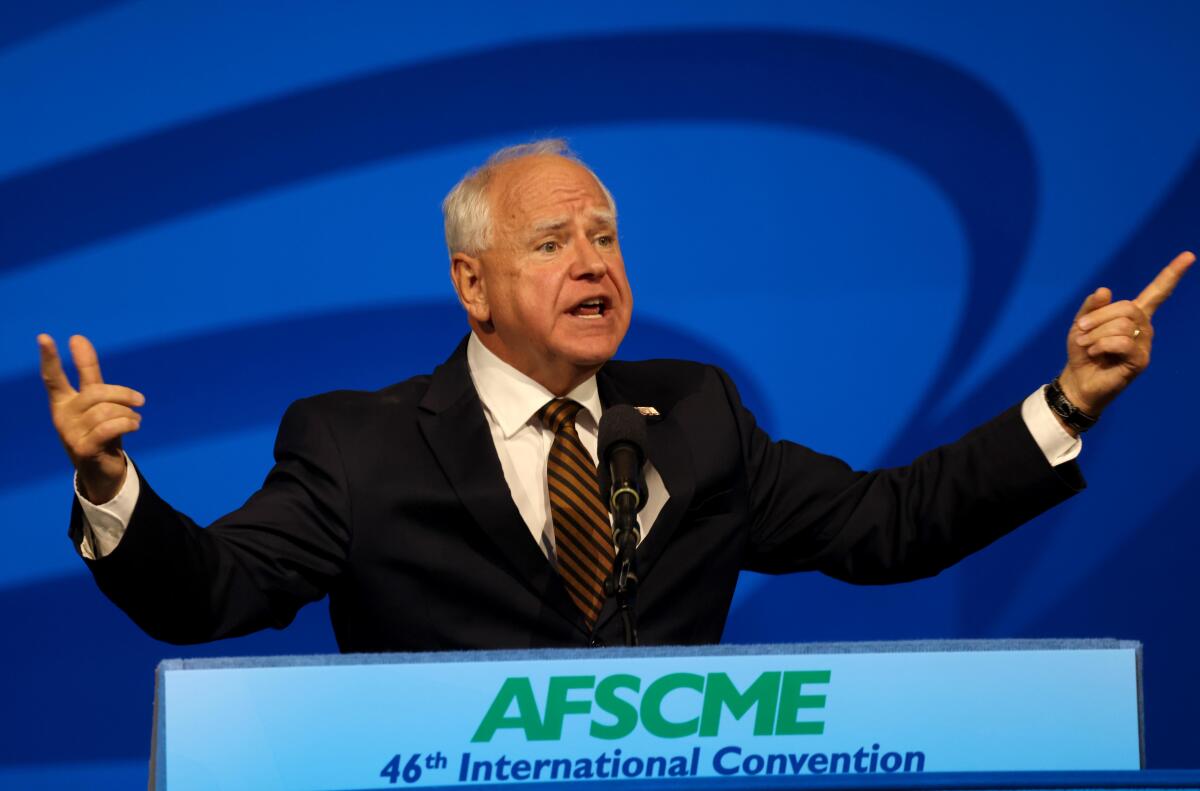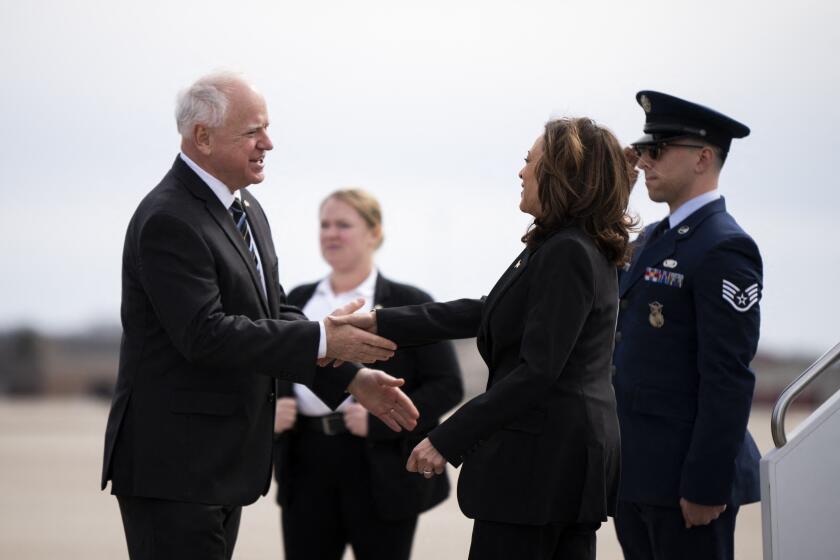Coach Tim Walz took a stand when queer kids desperately needed an advocate

- Share via
Harrison Butker, the Kansas City Chiefs player whose “Me Tarzan/You Jane” commencement speech caused an uproar last spring, was back in the news recently after signing a contract extension that made him the highest-paid kicker in the league. Well deserved, considering he’s the second most accurate in NFL history. Unfortunately, the occasion also provided an opportunity for him to double down on his remarks.
Opinion Columnist
LZ Granderson
LZ Granderson writes about culture, politics, sports and navigating life in America.
“I prayed about it, and I thought about it, and I was very intentional with what I said, and I stand behind what I said,” the 29-year-old told reporters last week.
Among the hits: calling diversity, equity and inclusion efforts “tyranny,” taking a swipe at President Biden’s faith and telling the graduating women, “I would venture to guess that the majority of you are most excited about your marriage and the children you will bring into this world.” Of his wife he said: “It cannot be overstated, that all of my success is made possible because a girl I met in band class back in middle school would convert to the faith, become my wife and embrace one of the most important titles of all: homemaker.”
It was like listening to a JD Vance demo track.
If she thought she needed to woo support away from Trump, she would have gone with a different vice presidential choice. What does this guy bring to the ticket?
However, the three-time Super Bowl champion did say something back in May that resonated with me: “Be unapologetic in your masculinity. Fight against the cultural emasculation of men. Do hard things. Never settle for what is easy.”
To some, Butker’s words about masculinity seemed toxic, reflecting misogyny and homophobia. To others, his thoughts sounded like a much-needed response to the current landscape, which is shaped by what is deemed politically correct for men to say and do.
Butker’s words stuck with me because I too believe men should “do hard things.”
It’s time to explain some details such as how the administration would get her plans through Congress and how her policies would be funded.
Where we disagree is on what the hard things are. A highly paid athlete using his platform to demonize initiatives that support minority and queer inclusion doesn’t seem brave to me. As the politician Sam Rayburn famously said: “Any jackass can kick down a barn, but it takes a good carpenter to build one.”
What it means to be a man in today’s America has been the focus of sociologists and conservative and progressive political pundits as well as politicians and podcasters. Some men, like Joe Rogan, have monetized the conversation. Some conservatives, like Sen. Tom Cotton of Arkansas and Vance of Ohio, are cosplaying some bygone myth of masculinity. And there are progressives who fall dangerously close to similar thinking, such as the strategist James Carville this March when he wagged an angry finger at “preachy females” in the Democratic Party.
American voters remember how the former president hurt them. And they’ve seen how Harris would support them.
Enter Tim Walz, governor of Minnesota and running mate of Vice President Kamala Harris.
Like Butker, he too loves football. And in 1999 while the Mankato West High School football team for which he coached was in the midst of a 2-4 start, Walz also became faculty advisor for the school’s first gay-straight alliance. For context: Matthew Shepard was found beaten and bloodied roughly 800 miles west in Laramie, Wyo., the year before. Billy Bean, the second former MLB player to come out, had not yet sat down with Diane Sawyer to talk publicly about his sexual orientation. Just 35% of the country supported same-sex marriage.
And there was Walz, a football coach in Small Town, USA, deciding to use his platform to help students who were being bullied. Later that year, the football team went on a winning streak and finished the season as state champions.
When I think of what it means to do the hard things, that’s as good of an example as any.
Among the Harris-Walz campaign stops this week was a fundraiser in Denver. There, several attendees told me how much they appreciated Walz being an ally long before it was trendy. This would include former student-athletes who were closeted during their playing days. When I asked Walz whether there had been any pushback for him supporting the LGBTQ+ students in his school, he said: “No, and that’s the thing I don’t think gets told. The community was accepting. It just had to be done.”
At the rally in Philadelphia at which Harris announced Walz as her running mate, she told the story of Walz volunteering as the GSA faculty advisor as well as that championship football season.
It was the kind of story Bean would have loved to have heard. Unfortunately, he died just hours before. Last fall, he was diagnosed with acute myeloid leukemia. Bean was 60 years old, the same age as Walz. Bean spent the last decade of his life trying to make the world of sports a more accepting space — as Major League Baseball’s senior vice president of diversity, equity and inclusion.
I’m sure Bean and countless others would have loved to have had a coach like Walz when they were growing up. Today’s queer athletes live in a world where allyship is becoming more the rule than the exception. This year, there were nearly 200 out queer Olympic athletes in Paris, with a third of them winning a medal.
Not sure how Butker feels about that showcase of diversity, equity and inclusion. As for me, I would like to think it’s the byproduct of a world in which men like Walz aren’t afraid of doing hard things.
More to Read
A cure for the common opinion
Get thought-provoking perspectives with our weekly newsletter.
You may occasionally receive promotional content from the Los Angeles Times.











